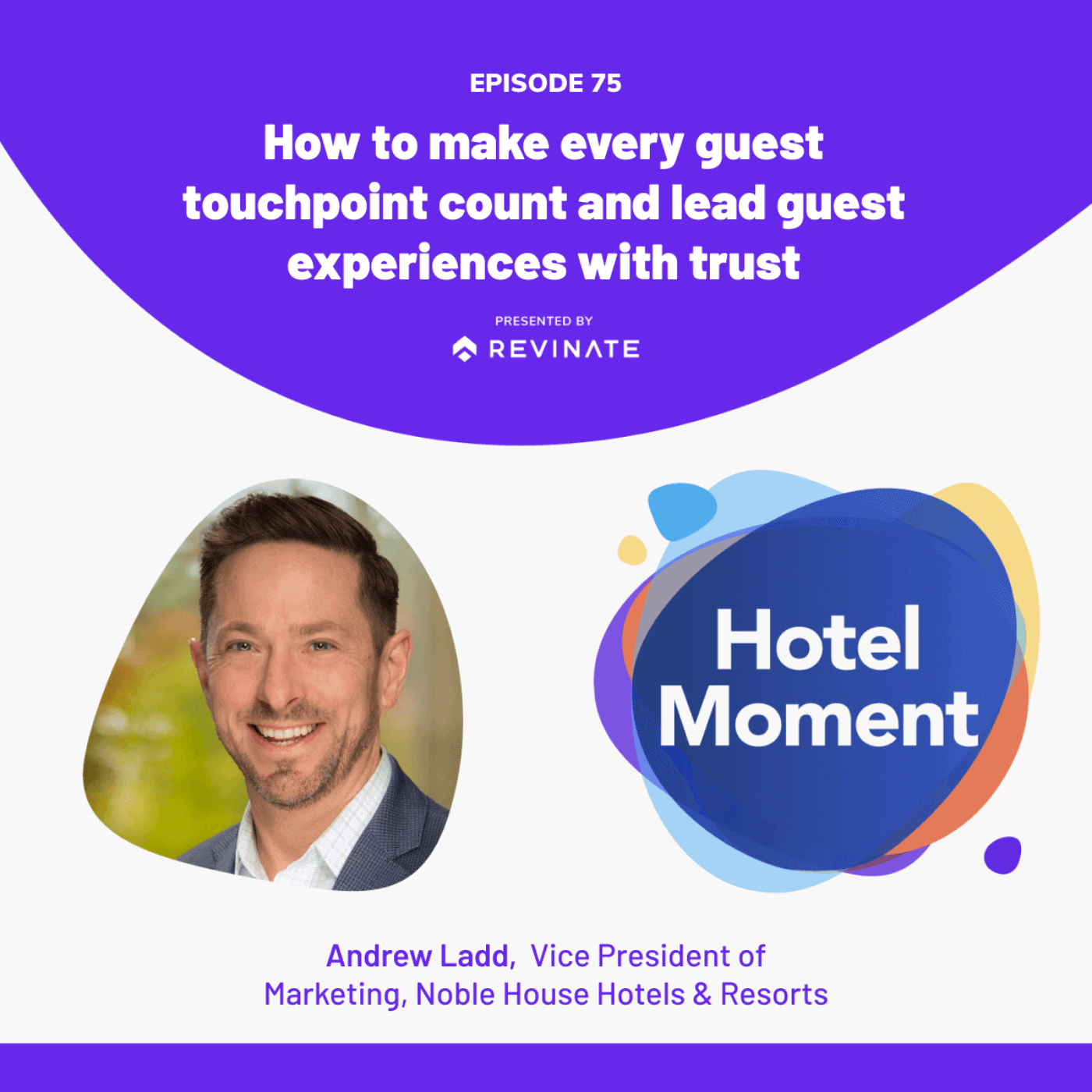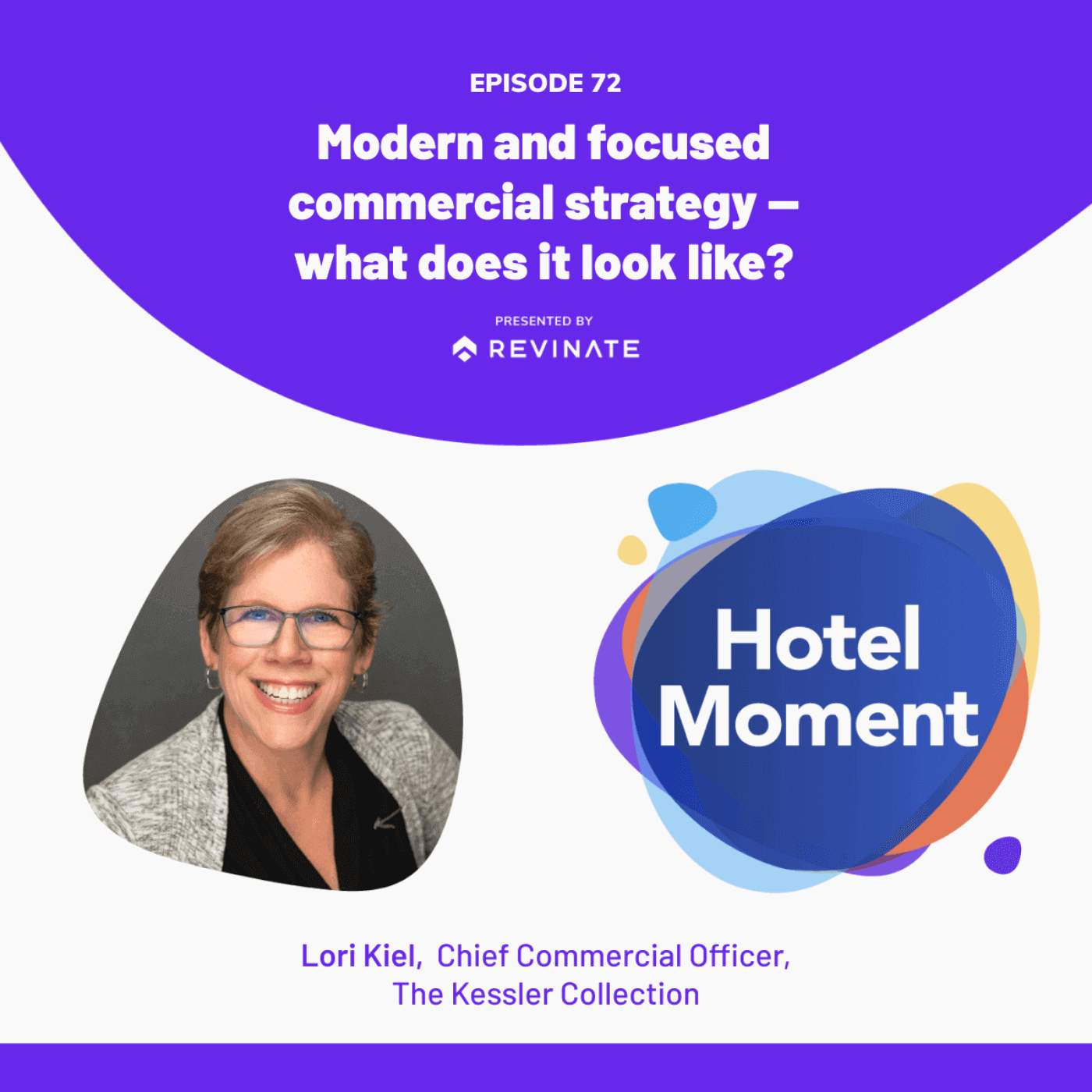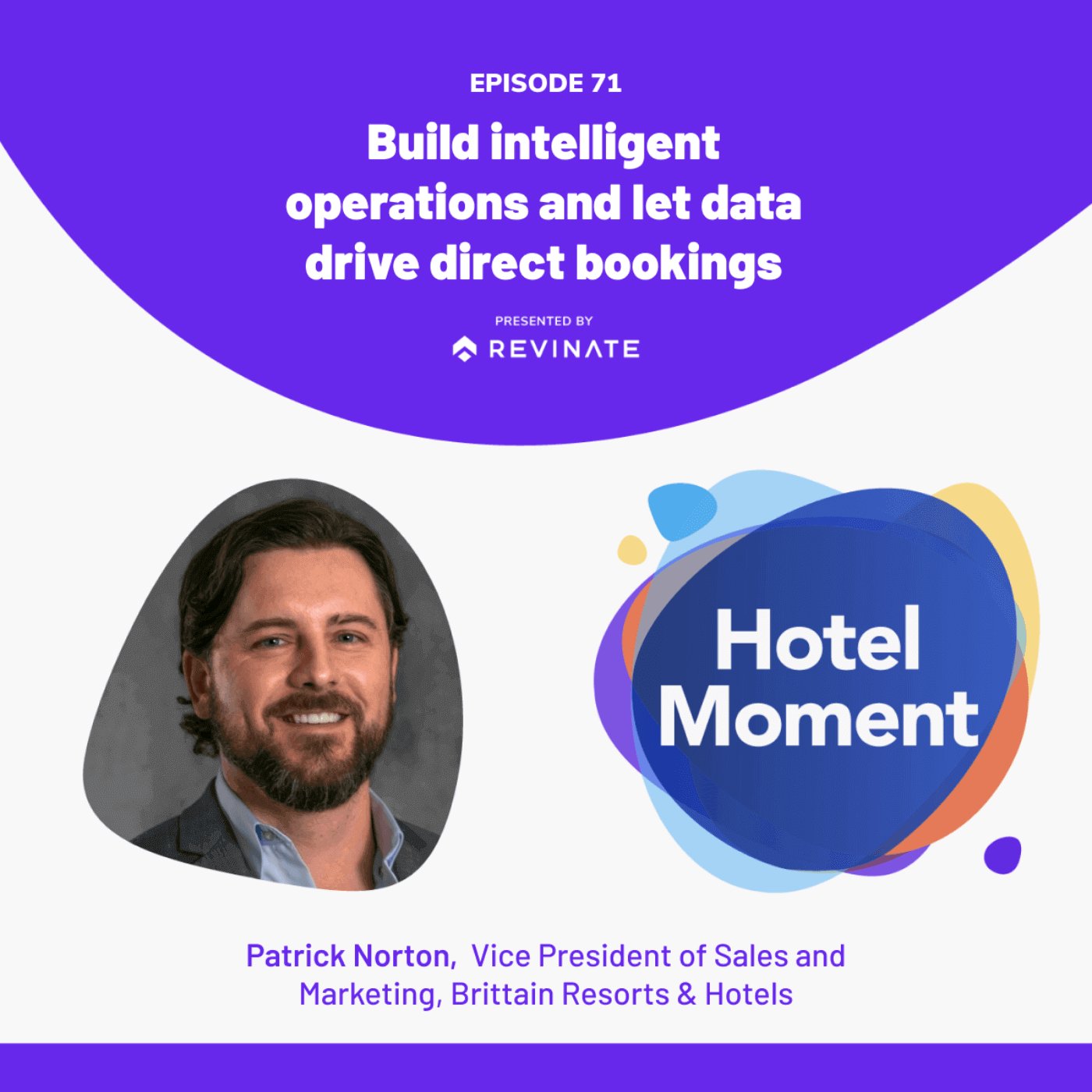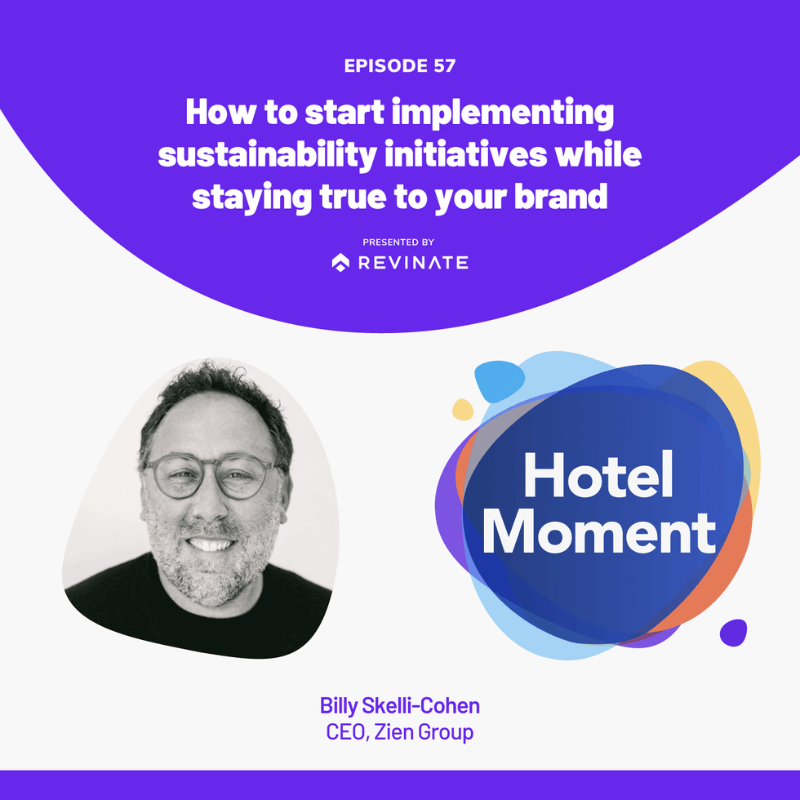

The Hotel Moment podcast — episode 57
How to start implementing sustainability initiatives while staying true to your brand
In this week’s episode of the Hotel Moment podcast, Karen Stephens, Revinate’s CRO, and Billy Skelli-Cohen, CEO of the Zien Group, explore the increasing emphasis on sustainability in the hospitality industry. You’ll discover practical tips for implementation while developing a greater understanding of sustainability’s global relevance in hospitality.
Tune in and find out how to design a greener stay for your guests to exceed their expectations while supporting your brand.

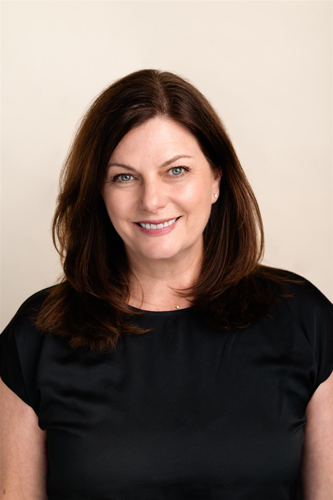
Meet your host
Karen Stephens is Revinate’s Chief Revenue Officer and runs the sales, marketing, and customer success teams. She has more than 20 years of experience in the industry alone.
On the Hotel Moment podcast, Karen speaks with leaders to draw out their experiences and insights. She is also a Francophile and Prof K — a coach, a mentor, a guide to the people who work with her.
Now Playing
Transcript
Karen Stephens: Welcome everyone to the Hotel Moment podcast. I am your host, Karen Stephens, the Chief Revenue Officer of Revinate, and today I am delighted to be joined by Billy Skelli-Cohen, who is the CEO of the Zien Group. Welcome, Billy.
Billy Skelli-Cohen: Thank you. Nice to be here. Thanks for having me.
Karen Stephens: I’m so excited. You know, we have an office in Amsterdam and I understand you’re based in Amsterdam and one of our favorite customers is actually part of the Zien group, Eden Hotels. So, it’s great to have you here.
Billy Skelli-Cohen: Good stuff.
Karen Stephens: Yeah. So before we jump into the questions, I, I wanted to ask you a couple questions about your background, a little bit more about how you got into the industry.
So if you’ll, if you’ll humor me, I’ve got a few questions to get going here.
Billy Skelli-Cohen: Sounds good.
Karen Stephens: Okay. So the first question, when did you start working the industry, and do you remember your first day on the job?
Billy Skelli-Cohen: Well, I fell into this industry a bit by accident. My, my first career was in retail — shares a lot of overlap with hospitality.
But in about 2002, I got involved in the sales and marketing side of the industry. And that was my start into the business and, and quickly caught the bug for, for the hotel business.
Karen Stephens: Ah, that’s cool. Okay, great. And what has been your most uplifting moment so far in your career?
Billy Skelli-Cohen: Well it’s, it’s tough to pinpoint one, right? I mean, they’re all about people, you know? It’s certainly the, there’s nothing that has moved me more in this business than things that I’ve either accomplished with a team or, you know, watching somebody grow in the industry or, or, or somebody that, you know, that starts, you know, a small little thing in the hotel that really touched me.
So while I struggle to pinpoint one, I can tell you that all the examples I would give you are, are all about people,
Karen Stephens: Right. People in, in, in the industry. Yeah. That’s great. So this is more of a, a question for your personal experiences. So, outside of work, what is the most striking experience you’ve had so far in terms of a food experience or a stay or a holiday that you’ve done personally?
Billy Skelli-Cohen: You know, I think like many people, I’ve experienced a bit of kind of the glamping and kind of some of these outdoors experiences where you kind of connect hospitality and nature together, that have just been incredibly special.
Karen Stephens: Yeah.
Billy Skelli-Cohen: You know, I can think of am trip to Costa Rica or the National parks in the US. You know, being in the middle of the countryside in France, and whether it’s staying in a, you know, in a villa that kind of makes kind of the mixture of old and new, and that yin and yang or, you know, a tent that’s fitting out like a proper hotel room. You know, the, being in these environments where you have the, the, the help of mother nature to enhance the experiences are some of the most special things I’ve certainly experienced in a few years, and I’ve been very inspirational in the way I look at the business moving forward.
Karen Stephens: Ah, that’s great. Yeah, I love that as well. I think we have that in common. All of the, now combining natural beauty with wonderful experiences and great hospitality is always cool.
All right. Fourth question. Have you met any celebrities while in the trenches?
Billy Skelli-Cohen: I have actually quite, quite, quite a few. I mean, you know me — let’s first define what meeting a celebrity is. I’m sure asked they probably wouldn’t remember who I am. But I, one that stands out is, I did a hotel called Sea Containers quite a few years back in London. And we had the kind of the premier party of the Entourage movie.
And I remember at the time I, you know, I had been quite a fan of the series and, and the guys were all there. And, and that was quite a neat moment just because I had really connected to that series. I love that series.
Karen Stephens: That’s, that’s a good one. That’s Entourage, HBO, going back, but wow. That’s a, that’s a good one.
Billy Skelli-Cohen: I remember they were all incredibly short.
Karen Stephens: Really?!
Billy Skelli-Cohen: Yeah. Oh my God. They’re, they’re all little, little tiny things.
Karen Stephens: All right, well, I’m really tall, so that’s kind of heartbreaking for me. Not that I had a shot, but still. Okay cool. So coming on, tell us a little bit about the Zien Group, but you’re the CEO now, you’ve been there for, how long have you been there? Just under a year, 5 months?
Billy Skelli-Cohen: It’s a year and a couple of months.
Karen Stephens: Okay, great. Fantastic. So can you give us a little bit idea about what the group is and Eden Hotels that falls under that group?
Billy Skelli-Cohen: Yeah, so when I took on the rule zine group didn’t exist, right? It was, it was Eden Hotels and Eden Hotels is a 75-year-old business.Not many businesses around the world can claim to be 75 years old. It was a third-generation family business, you know, that went through kind of its ups and downs, typical family business over the years. But that, you know, acquired these 14 incredible hotels over the years. And the Zien Group was created soon after I started because we had an ambitious plan in what we want to do with the portfolio and ambitious plans for growth. And we wanted to create a bit of kind of a parent company, an umbrella company that could capture all the future brands and the future strategies that we hope to do in the future.
Karen Stephens: Okay great. So you mentioned something there.
You’re talking about building and the marketing of a hotel brand. So can you talk a little bit about that? So what does it take, if you even know you, Eden Hotels is 75 year family-owned company, now you’re expanding and looking to bring on more hotels. So when you think about building the brand itself, how do you approach that?
Billy Skelli-Cohen: Yeah, I mean, interestingly enough, the first thing we decided to do is, is realize that our current hotels shouldn’t all live under the same brand. So we’re actually going through an exercise and, and we’ll probably end up with 3 different strategies out of the current portfolio, and that will be the springboard for growth. Where, we can now digest hopefully future acquisitions and opportunities under 3 distinct strategies.
You know, brands are, are, are a funny thing in our industry, right? Just probably like you, we live in and breathe hotels every day, and we can’t keep up with the number of brands that, that are being launched every day. You know, for us, when we, when we think of a brand, we really think about internal versus external.
You know, we think about employee branding before we think about consumer branding. You know, you know, to me it again, really starts with people, right? If you’re not creating an ecosystem, a brand, that, that really resonates a, a, a culture throughout your business, no matter how great the, the consumer idea is, the execution will fail.
So that’s really where it all starts for us is, is thinking about creating a brand and how it’s going to resonate internally and what does it means to our operating standards. What does it mean to our hiring standards? What it means to empower the people that work within our group. And then we start thinking, “Okay, well, you know, we, we think we have a good idea here.”
We think we have something interesting to pull a group of hotels together. You know, “What, what’s our edge here?” To try to generate some spotlight and, and some emotional connection with, with certain guests.
Karen Stephens: You know what, I absolutely love, love that Billy. Talking about the internal branding first, and that really resonates with me because you know, I’ve been with Revinate for 10 years and I am so loyal to our company and to our brand. It’s the culture, right? It’s the culture of the people. And so I love the idea, you know, at a hotel, once you kind of instills that culture, and people feel a certain way about being there, then that transmits out to the guests. And then kind of the things that go on top of that, the external facing brand, it’s really just icing on the cake, but the cake is the people.
So thank you for that. I, I love, I’ve never really heard it put that way, and I think it’s really interesting.
Billy Skelli-Cohen: Yeah. I mean, obviously these things always happen in parallel, right? But we are very aware, right?. I, you know, clearly it’s all about the team, right? But even if I thought I was Superman, right? I, without filtering a vision, a purpose, and clarity on a way of working that truly can get the most outta people and, and a place where they can be proud and happy.
It’s difficult to believe that you can create a brand that will be successful out in the market, in in, in our business.
Karen Stephens: So, shifting back a little bit to well, Eden Hotels itself, I know one of the things that you have focused on in the past, and still focus on today, is sustainability.
So can you give us a little bit of an idea of, well, I mean, I think, I think most people know, but what do, what do you consider to be sustainability and why is it important, not only for Eden Hotels, but for hoteliers — for the hospitality industry at all?
Billy Skelli-Cohen: Sustainability is a word that I’m starting to, to struggle with a little bit in our industry because it just means such different things to different people.
And, and also it, it kind of gets thrown around as a marketing tool, where again, right, our starting point is not to use sustainability as anything that we market, but just being responsible business owners that employ people and host guests in our hotels, right?
And, and to think about that, you know, you have to recognize that our hotels are fairly wasteful businesses, right? So what are the things that we want to focus on that can make a difference, right? Where we feel we can be good neighbors, you know, good employers and good guests you know, good hosts for our guests. So, you know, we, we, frankly, I don’t think we’ve, we’ve been doing anything that’s original. We are just trying to be really committed to it and doing it well.
So for example, if you look at the majority of our, of our Eden Hotels, absolutely everything that is in our hotel is locally sourced. You know, if you look at, you know, the way that we, we want to manage laundry, waste, you know, all these kinds of assembly lines that we have in hotels, these, these kinds of big consumers of, of things around, about, around sustainability.
We, we really rethink day in and day out, “How can we do that more efficiently?” Right? We are totally rethinking our collateral strategy. We are completely committed to being single- plastic use business and all these things. You know, while they, they might think a little bit, kind of like page 1, line 1 of sustainability, to commit to them and doing it well, is actually incredibly difficult in, in, in our businesses.
So again, I guess the short answer would be that we, we’re committing to doing a few things very well.
We’re embarking in plans of, of some renovations of our hotels and, and that’s where we really feel we, we have an incredible opportunity.
Again, whether it’s, you know, to think about materials or energy consumption, you know, kind of these, these big ticket items and, that’s at the heart of our conversations as we are entering some of those renovation plans before you start.
Karen Stephens: Yeah. So it’s kind of like we, we were talking about for the, the brand, it’s like sustainability that’s not just for the sake of a marketing plug, but really embedded in the culture. And then it really, it resonates with guests naturally because people, people appreciate that. But it’s, it’s more of a, an approach to business. So for, for other hotels out there that are just trying to get started, you know, as you mentioned, it’s a very wasteful industry that we’re in and it, it is easy to have things that you can easily throw away you, you don’t have to clean for the next guest. You just, you know, chuck it in the, in the trash.
What is something, what are 3 things maybe that hoteliers could do just to get started on that journey if they want to move to a more sustainable existence?
Billy Skelli-Cohen: Well, first of all, I’ll give you a little anecdote, right?
I don’t know if you can remember the day, and it wasn’t that long ago where, where every hotel was screaming that they had high-speed internet in their hotel, right?
Karen Stephens: Yes.
Billy Skelli-Cohen: And, and now we, we take high-speed internet is like saying you have electricity or running water in your hotel, right? And, we’re still in a little bit of a period where, as an industry and, and not for any wrong reason, right, but a lot of people, you know, kind of put it out there, you know, like we are green key holders, for example, in the Netherlands, right? Or whatever tool and mean you can use to demonstrate to your corporate clients and all your guests, that you are doing your part for sustainability. And I have no doubt that in 5 years, you know, it will be like Internet. It will have to be a given that you’re doing this. So let’s not think about this anymore as a marketing tool. Let’s not think about, about doing more or less. You just have to do it to the best of your ability in the environment that you are given.
I would also say having operated in Europe and in the US right?
Sadly the US is quite a way behind Europe in terms of sustainability, right?
Karen Stephens: Yeah.
Billy Skelli-Cohen: For example, you know, if you’re a large size hotel in the US right now in the city center, it is practically impossible to be a single-use plastic. You just cannot get the suppliers on board yet. And, and again, that will come around, right?
But that, that’s worth highlighting. So 3 things. You know, think about your employees. Think about your neighbors, right? And think about the way you would want to treat a place where you, where you drink and eat every day, right? And, and if you hold true to those values, and you want to be a good neighbor, and a good employer, and you want to do right by your guests, that should push you to make the right decision in the environment that you are in to, you know, to care about the planet, right?
The last thing I would say, apologies if I’m going on, is get help. You know, there’s a lot of good people out there now. There’s a lot of organizations. You gotta filter through them. Some of them are a bit more real than others, but as a whole, there’s a lot of people, you know, learn from the people who are doing it. Learn from, you know, consultants who, who can help out on that front.
Karen Stephens: Okay, so 1 point of clarification for our US listeners, when I hear single-use plastic, I think of stuff that I use 1 time and throw it away. So can you define, define that for us a little bit more if you’re saying single-use plastic?
Billy Skelli-Cohen: Yeah, I think that’s a really good, good point, right? So for example, I think, in a hotel, when people think of single-use plastic, they think about the little shampoo bottles in a hotel room. And clearly, American hotels, like European hotels have the same opportunity to go to big bottles and buy bottles and so forth, right?
But for example, when you have a supplier that’s delivering your meat or your vegetables or whatever it is, right? The US still has a real mentality that everything gets wrapped in plastic or everything is in plastic bags and so forth, right? And, and to get a supplier on board to say, right, “I want a, an assembly line through and through that is single-use plastic.”
You, you can’t do it on your own, right? You need your, your ecosystem to be on board with that. So that, that’s what I meant by that.
Karen Stephens: Okay, great. So, so all the way, everything coming in the hotel, what’s in the hotel, it, the whole ecosystem is more sustainable, which is, you know what, I hope you’re right.
It sounds so aspirational. I mean, being in the United States, and I know exactly what you’re talking about. You know, we, we, we have a real problem here with you know, I even look as a consumer, how much goes into my bin just from the market out the door. So, we do have a long way to go, but it’s not impossible.
It’s just, I think about my friends who live in Stockholm, and when I’m at their house sorting the garbage, it’s like, you know, the very little of it that’s actually garbage. And the things that are garbage, they actually, they burn a lot, they actually export it to other countries to use for fuel. So.
Billy Skelli-Cohen: I’m not sure the Netherlands quite meets a Stockholm and Sweden standard, but clearly the, the Northern European countries seem to be certainly, in the western world, leaders kind of on, on the sustainability front. So I guess for us, we probably feel that once we wanna start growing in other areas, we probably have a pretty good baseline already.
Karen Stephens: Yeah, that’s great. And I think it’s 1 foot after the other. And I also think that the generations coming up will demand it.
Billy Skelli-Cohen: You know, we have young people that join our group that will ask us questions around that. And I think that’s great. Let them keep us on our toes.
Karen Stephens: That’s right. So for all those young people, keep us on our toes as you’re coming into the industry as well.
Billy Skelli-Cohen: Don’t be too hard on us, but a little bit is, is fine.
Karen Stephens: Yeah, that’s right. Okay. Very cool. Anything else for our listeners, Billy? You know, we’re kind of coming up at the end of the first quarter of, of 2023, and what’s on your mind as we kind of look out for the rest of the year and, you know, what are you thinking for your group and for the industry at large?
Billy Skelli-Cohen: Yeah, I mean, you know, we, we live in, in pretty uncertain times, right? I think very few of us, I’m certainly not smart enough to always make sense of all the macroeconomic and micro-social things that are going on in the world right now. And, and I think at times it can, it can stress a lot of us out. And, and, you know, people worry about, you know, are we the right industry to employ people? Are we, are we a robust industry in the future given how, what happened with Covid? But I guess my, my message is, you know, while some of the uncertainty in the world at times gives me a little knot in my stomach and can make me a little bit nervous at times, when I can take a kind of medium to long term view, I’m incredibly hopeful about our industry.
You know, I think, you know, people want to travel. People want to, you know, experience cities and countrysides and this beautiful planet. And you know, I think more and more people will continue to travel. They might travel differently. You know, they might travel more local. They might be less or more corporate travel, less or more leisure travel, depending on the markets, the cities, and so, but overall, I’m incredibly upbeat in our industry.
I’m also incredibly upbeat that, you know, we were forced to do a little bit of a reset as an industry, and I think a lot of positive will come of that. You know, I think it will make us stronger. It will make us a more appealing industry to work. And I think it will make us work harder to continue kind of wooing our guests no matter what it is that they’re searching for when they’re on the road.
Karen Stephens: Yeah. Well, you know what, I share your optimism. Thank you. I think you’re right on the money there. So thank you so much, Billy. So my guest has been Billy Skelli-Cohen, CEO of the Zien Group.
And if our guests wanna find out more information do you have a URL you can share for the, for the audience?
Billy Skelli-Cohen: Yes. The, the Ziengroup.com
Karen Stephens: Okay. Z-I-E-N. You heard it here first. All right. Thank you so much.
Billy Skelli-Cohen: Karen, thank you for your time. Really appreciate it.
Karen Stephens: Thanks, Billy.
Media
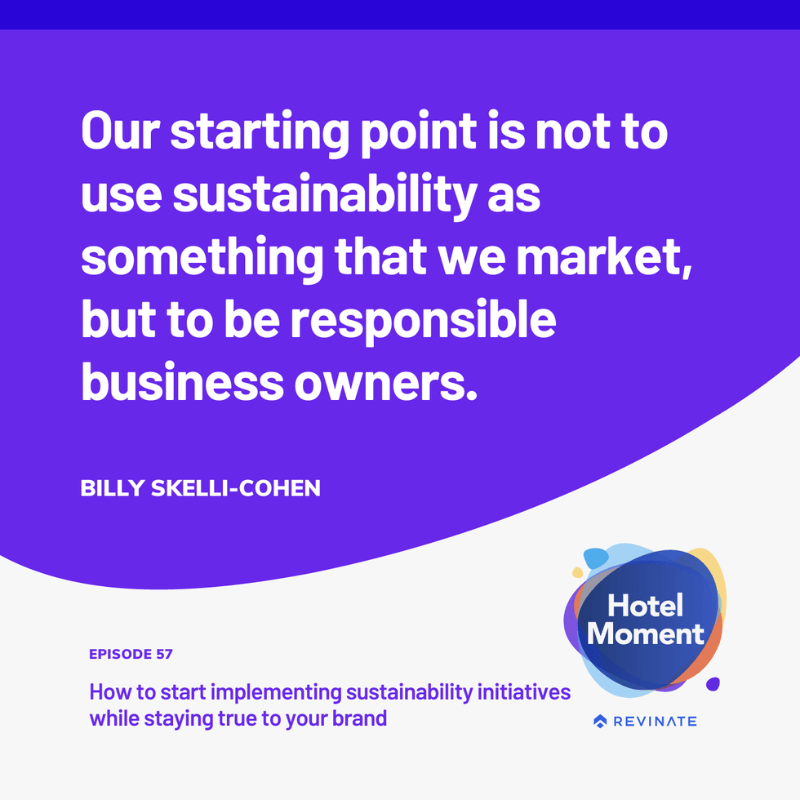
Authentic sustainability
The future of sustainability in hospitality
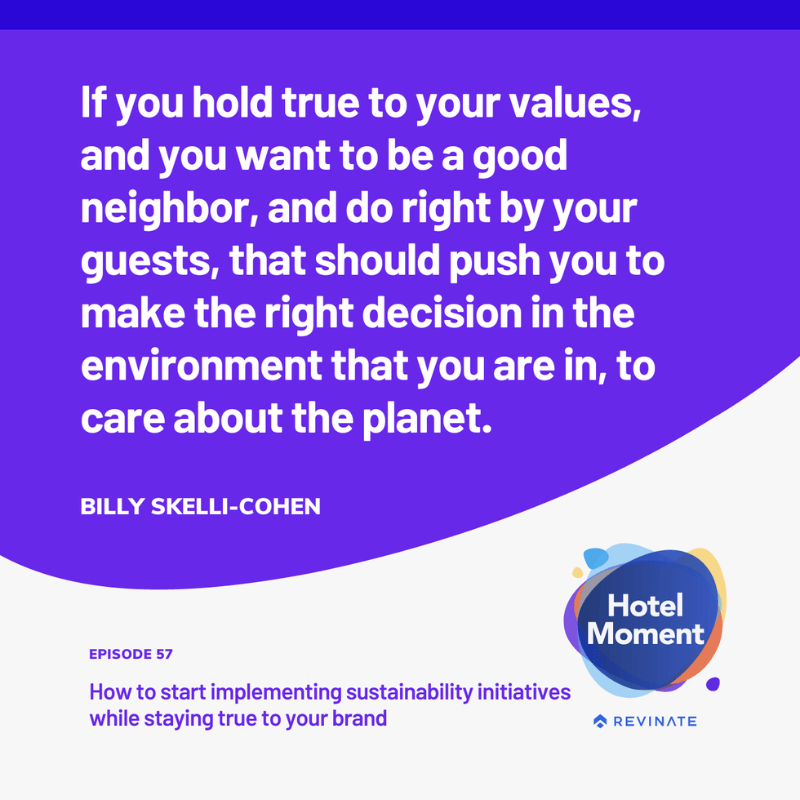
Finding your “why”
Developing a hotel brand
Related episodes


Be the first to know when a new episode drops
This site is protected by reCAPTCHA and the Google Privacy Policy and Terms of Service apply. *Required fields.




